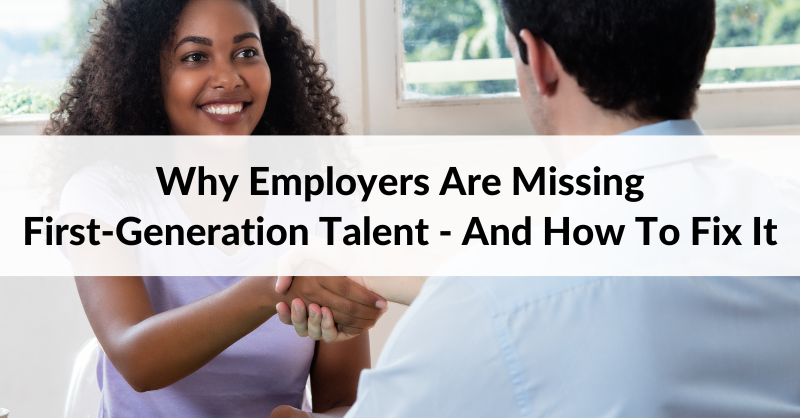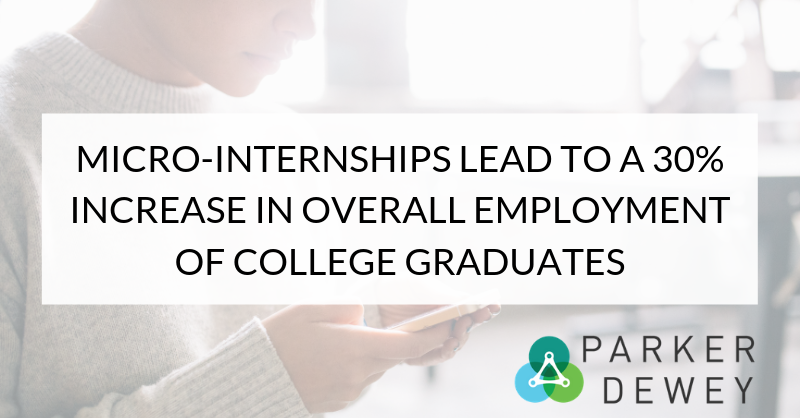
Why Employers Are Missing First-Generation Talent - And How to Fix It
Recently, I came across a TikTok account called Lay of the Land. Each video documents the details and steps necessary for a positive experience at local venues, including getting there, parking, accessibility, where the restrooms are, and even tips like where and how you can pay or check out. The account, with tens of thousands of followers, states that it is ‘easing anxiety one TikTok at a time’, and their videos are flooded with comments of gratitude and enthusiasm for trying new places, now that the viewers know how to navigate them.
The success of the account reflects that anxiety about everyday interactions, especially those that aren’t familiar, is not uncommon. Unfortunately, stress associated with the unknown is an unavoidable reality for first-generation students, who are navigating the world of higher education and the resulting job search without a parent who can tell them what to expect.
Who are first-generation students?
The term ‘first-generation’ is typically applied to any higher education applicant, attendee, or graduate without parents who have earned a baccalaureate degree themselves. However, there is no precise, universally accepted definition of exactly who a first-generation student is, which often results in additional uncertainty for these students regarding whether they qualify for the organizations, scholarships, and resources designed to support this population.
As was highlighted by the Harvard Business Review, first-generation students are often highly-qualified, driven young professionals with unique and valuable perspectives to bring to the workplace. With about one-third of graduating students considered to be first-generation, this population also represents a significant number of today’s college students and recent graduates.
Why employers are missing first-generation talent
To their detriment, first-generation students are significantly more likely to lack pre-existing relationships with professionals that second-generation students might have built through their parents. Throughout their college education, they continue to struggle to build a professional network as they are more likely to have to commute to school, as well as have prior commitments—like caring for family members or working a job—during hours when career fairs, info sessions, and other networking events typically take place.
The same challenges that keep these students from building their professional networks often also preclude them from participating in activities that recruiters look for, including leadership roles in on-campus organizations, as well as traditional internships (even paid ones) with schedules that would require the student to quit the stability of their existing job or jobs.
The pressure and need for stability felt by many first-generation students also ends up impacting their choices in the full-time job search. Unfortunately, first-generation graduates often end up taking lower-paying jobs that they are overqualified for, because such an offer is real, and the potential of a higher-paying role that would make better use of their skills is a hypothetical risk. This is prime talent that could be making a significant positive contribution at an organization and in a role that’s a better fit, but instead is being wasted because someone else happened to engage that student or recent graduate when they were most in need of stability.
Talented first-generation students are also more likely to be found at lesser known universities or community colleges, not because they don’t have the aptitude for more prestigious institutions, but because their financial realities and lack of resources require them to select an institution that will meet not only their academic needs, but their financial and social needs as well. This likely explains why two-thirds of students enrolled in open admissions institutions are first-generation, compared to less than one-third at more selective schools. With this in mind, if an organization’s recruiting team is focusing their efforts primarily on large, well-known, prestigious institutions, they are likely to miss these ambitious and talented students.
How Micro-Internships can help
Due to their ability to navigate the challenges highlighted above, first-generation students are often determined, creative, critical thinkers who would benefit any organization. To make sure your company isn’t missing out on this high-quality talent, it’s important to create opportunities that are accessible. Micro-Internships, for example, act as a stepping stone that helps your organization engage and benefit from first-generation talent in the following ways:
-
Expanded Reach and Accessibility: With students and recent graduates from over 5,000 higher education institutions on Parker Dewey, you can post your Micro-Internship project with confidence that it’s going to reach a diverse population of talent, including those motivated first-generation students at institutions that may not be included in your existing recruiting plans. The flexible, deadline-driven nature of these Micro-Internships also allows first-generation students to build experience without requiring them to shirk existing responsibilities or sources of income, making them accessible to this demographic.
-
Industry Awareness / Brand-Building: Micro-Internships allow your company to give first-generation students a sneak peak into what your day-to-day work is like, so the student can begin conceptualizing whether they see themselves doing that type of work longer-term. This is especially crucial for first-generation students, who likely weren’t exposed to a wide range of degree-required career paths growing up. With the Micro-Internship model, you’ll find talented students like Yonas Kemal, a first-generation student from UNC Chapel Hill who started engaging in Micro-Internships as a sophomore with the goal of exposing himself to a variety of industries and possibilities.
-
Low-Lift Relationship Building: According to our student sentiment survey, students’ primary goal when engaging in campus recruiting activities is relationship building. Although Micro-Interns primarily work independently, making each engagement a low lift for the company, supervisors are encouraged to have brief check-in’s with their Micro-Intern throughout the project. These meetings are a significant opportunity for Micro-Interns to engage with members of your team in a meaningful way. This is especially appealing to those first-generation students who traditionally struggle to build social capital. For example, D’Ziyah Mitchell, a Micro-Intern from Howard University pointed out just how much the networking aspect of her Micro-Internship positively impacted her experience.
-
Cost-Effective Results: Typically, Micro-Internships only require about 10-40 hours of work, and consequently only cost a few hundred dollars for companies. Especially compared to NACE data regarding traditional recruiting costs, Micro-Internships are an extremely cost-effective way to accomplish recruiting goals, while still acknowledging that the associated pay is crucial to first-generation students who typically come from lower socioeconomic backgrounds.
-
Low Risk: The short-term nature of Micro-Internships allows your organization to give first-generation students a chance to make an impression, without the risks of immediately committing to a longer-term experience. Although short-term, you’re getting to check something off your professional to-do list, while simultaneously seeing firsthand the skills and intrinsic motivation that each Micro-Intern brings.
- Intentional Engagement: Parker Dewey has partnerships with multiple organizations (including Braven, Bottom Line, and University Innovation Alliance) that focus on creating accessible pathways and opportunities for first-generation students. By featuring projects to students affiliated with these organizations, companies can intentionally include first-generation students in their recruiting efforts.
In conclusion, any organization seeking to add motivated students with a proven ability to overcome obstacles needs to be engaging first-generation college students, and Micro-Internships make it easy.
To hear directly from a first-generation graduate who is also a former Micro-Intern, as well as an employer who has worked with first-generation students via Micro-Internships, check out our webinar, Engaging First-Generation Students with Micro-Internships.




